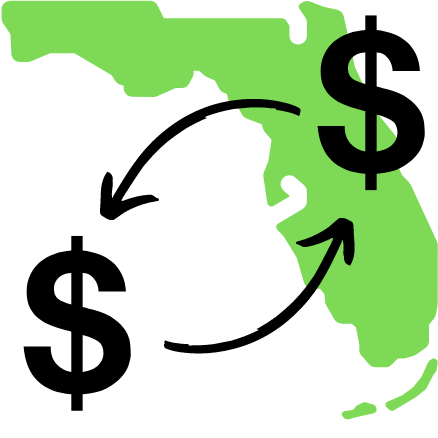
Florida Statute 560.103(23) (related to the regulation of money services businesses) defines a money transmitter.
A money transmitter is a corporation, LLC, LLP, or foreign entity qualified to do business in the state of Florida which receives currency, monetary value, or payment instruments for the purpose of transmitting the same by any means, including transmission by wire, facsimile, electronic transfer, courier, the Internet, or through bill payment services or other businesses that facilitate such transfer within this country, or to or from this country.
This differs from the federal law definition of money transmitter found at 31 CFR 1010.100(ff)(5):
A money transmitter is a person (i.e. a human or business) that accepts currency, funds, or other value that substitutes for currency from one person and transmits currency, funds, or other value that substitutes for currency to another location or person by any means (including through a financial agency or institution, through a Federal Reserve Bank, through an electronic funds transfer network, or through an informal value transfer system). Additionally, the definition of money transmitter includes any other person engaged in the transfer of funds.
However, notwithstanding that general definition, the determination of whether a person is a money transmitter is a matter of facts and circumstances. The term does NOT include a person that only:
- Provides the delivery, communication, or network access services used by a money transmitter to support money transmission services (e.g. an internet service provider);
- Acts as a payment processor to facilitate the purchase of, or payment of a bill for, a good or service through a clearance and settlement system by agreement with the creditor or seller;
- Operates a clearance and settlement system or otherwise acts as an intermediary solely between BSA (Bank Secrecy Act) regulated institutions. This includes but is not limited to the Fedwire system, electronic funds transfer networks, certain registered clearing agencies regulated by the Securities and Exchange Commission (“SEC”), and derivatives clearing organizations, or other clearinghouse arrangements established by a financial agency or institution;
- Physically transports currency, other monetary instruments, other commercial paper, or other value that substitutes for currency as a person primarily engaged in such business, such as an armored car, from one person to the same person at another location or to an account belonging to the same person at a financial institution, provided that the person engaged in physical transportation has no more than a custodial interest in the currency, other monetary instruments, other commercial paper, or other value at any point during the transportation;
- Provides prepaid access; or
- Accepts and transmits funds only integral to the sale of goods or the provision of services, other than money transmission services, by the person who is accepting and transmitting the funds.